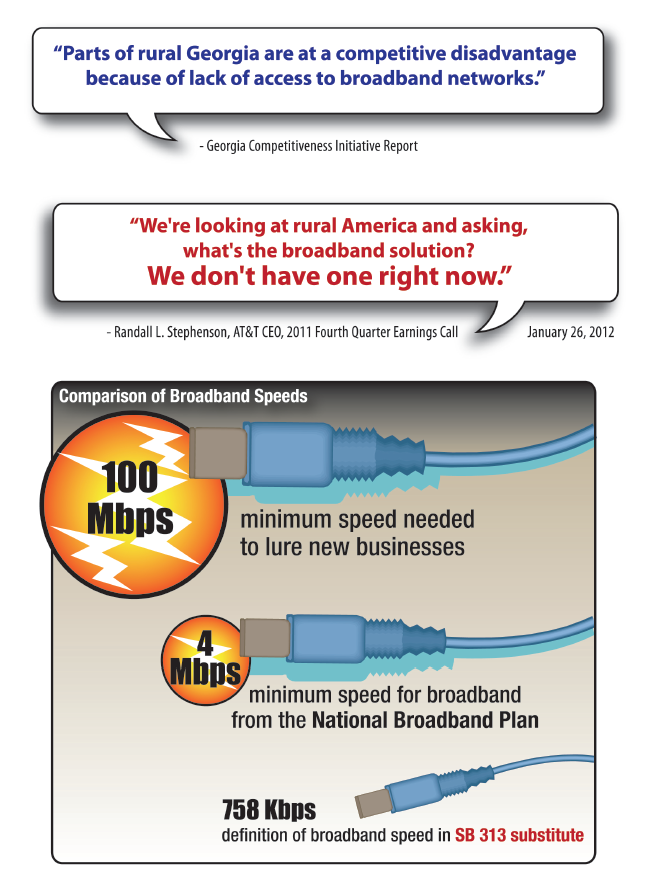
Fast, affordable Internet access for all.

 Note, that AT&T was originally trying to define broadband at the absurd 200kbps level but a substitute bill would have bumped it up to a still-too-low 768kbps, which is referenced above.
The other flyer that apparently made a difference with legislators is here:
Note, that AT&T was originally trying to define broadband at the absurd 200kbps level but a substitute bill would have bumped it up to a still-too-low 768kbps, which is referenced above.
The other flyer that apparently made a difference with legislators is here:
 Rememeber that elected officials often think of broadband in binary terms. You have it or you don't. In their mind, if you have options aside from dial-up, the problem is solved. These are people that often do not know what is needed to attract economic development, work efficiently from home, or successfully compete remote education courses.
Graphics that explain why we need next-generation networks rather than simply expanding last-century DSL can be remarkably helpful.
Rememeber that elected officials often think of broadband in binary terms. You have it or you don't. In their mind, if you have options aside from dial-up, the problem is solved. These are people that often do not know what is needed to attract economic development, work efficiently from home, or successfully compete remote education courses.
Graphics that explain why we need next-generation networks rather than simply expanding last-century DSL can be remarkably helpful.We are running a guest commentary today. Eric Null is a third-year law student at Cardozo Law School in New York City. He is passionate about corporate and intellectual property law, as well as technology and telecommunications policy. Follow him @ericnull or check out his papers. While researching a paper about municipal broadband networks, I was struck by the tremendous benefits that municipal networks can provide. It can be the first high-speed Internet link for an area without broadband, or it can provide some much-needed competition in areas that currently have access to broadband, but for some reason that existing access is unsatisfactory (e.g. price, service). Municipalities, in theory, can run the network for the benefit of the public rather than with a vicious profit maximization motive. Indeed, municipal networks bring many benefits. But first, a little history. In the United States, cable providers have set up regional monopolies for themselves, and “competitors” such as DSL and satellite are characterized by slower connection speeds and it is arguable that they are actual substitutes to cable access. Certainly within the cable industry, any “competitive” cable company attempting to compete with incumbents is met with high costs of building new infrastructure and lack of customer base. Municipalities can pick up where smaller, private entities cannot succeed. Municipalities have had a long history of investing in critical infrastructure, and they have the mentality for long-term planning that private companies simply cannot enjoy. A large company like Verizon likely has to justify any expansion of its network to its investors and ensure them that the venture will return a profit relatively quickly. Not so with municipalities; a city network allows its citizens to benefit indirectly (and directly) over the long-term. Thus, city governments can be a formidable competitor in the telecom and cable industries. Some states, regrettably, have banned or restricted the practice. In Nixon v.
A municipal government cannot possibly hope to compete with well-capitalized broadband providers in a highly competitive market.For those unfamiliar with Heartland, they don't use the same definitions for common words like "competitive" as the rest of us do. In Heartland's world, "competitive" means a market in which one of our funders operates regardless of how much competition exists in it. So why do we need new legislation to make it even harder for communities to build the networks that the cable and DSL companies won't build?
The SCCTA has been actively following the AT&T-backed legislation that would amend the Government-Owned Telecommunications Service Providers Act. House Bill 3508 would impose the same requirements on government-owned broadband operations that are currently imposed on telecommunications operations.Of course, H.3508 goes far beyond applying the "same requirements." It enacts a host of requirements that only apply to public providers, which are already disadvantaged by being much smaller than companies like Time Warner Cable and AT&T. We have long ago debunked the myth of public sector advantages over the private sector. The second quarter newsletter [pdf] identifies this bill as the highest priority of the cable association:
H3508, the AT&T backed legislation, has been our dominate piece of legislation in 2011.
The other is rural access lines; we have been apprehensive on moving, doing anything on rural access lines because the issue here is, do you have a broadband product for rural America? We’ve all been trying to find a broadband solution that was economically viable to get out to rural America, and we’re not finding one to be quite candid. The best opportunity we have is LTE.Whoa! LTE is what you more commonly hear called 4G in mobile phone commercials. The best they can do is eventually build a wireless network that allows a user to transfer just 2GB/month. That is fine for hand-held devices but it does nothing to encourage economic development or allow residents to take advantage of remote education opportunities. But even the CEO admits they are not bullish on LTE as the solution:
[W]e’re looking at rural America and asking, what’s the broadband solution? We don’t have one right now.Some may be wondering about "U-Verse" -- AT&T's super DSL that competes with cable in the wealthy neighborhoods of bigger cities. U-Verse cannot match the capacity or quality of modern cable networks but is better than older DSL technologies. But U-Verse is not coming to a rural community near you. For those who missed the fanfare last year, AT&T's U-Verse build is done. AT&T's lobbyists have probably forgotten to tell Georgia and South Carolina Legislators that the over 20 million AT&T customers without access to U-Verse are not going to get it.
Rogers’ legislation is exceptionally friendly to the state’s incumbent phone and cable companies, and they have returned the favor with a sudden interest in financing Rogers’ 2012 re-election bid. In the last quarter alone, Georgia’s largest cable and phone companies have sent some big thank-you checks to the senator’s campaign:Phil also refutes the supposed failures cited by those pushing the bill. Not only do such stories misrepresent what really happened, some actually cite EPB's incredible 1Gbps service as demonstrating that munis are out of touch. What else would you expect from the Heartland Institute, which made its name fighting against the radical claim that cigarettes are linked to cancer? Government Technology's Brian Heaton also covered the story in "Georgia Community Broaband in Legislative Crosshairs."A review of the senator’s earlier campaign contributions showed no interest among large telecommunications companies operating in Georgia. That all changed, however, when the senator announced he was getting into the community broadband over-regulation business.
- Cable Television Association of Georgia ($500)
- Verizon ($500)
- Charter Communications ($500)
- Comcast ($1,000)
- AT&T ($1,500)
In addition, Mitchell [me] said that SB 313’s requirement of the public entity paying the same taxes or the same cost of capital as the private sector is another red herring.